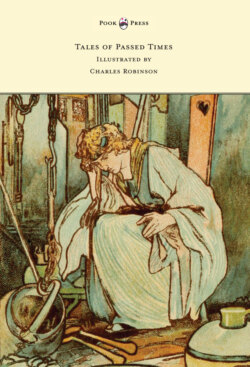Tales of Passed Times - Illustrated by Charles Robinson

Описание книги
Tales of Passed Times' is a collection of Charles Perrault's fairy tales, accompanied by the beautiful illustrations of Charles Robinson. A French nobleman and writer, Perrault (1628-1703) was among the first authors to bring magical children's stories into the literary mainstream, proving to their original seventeenth century readers that such works were important, enjoyable, as well as thought-provoking. The stories in this particular text include such favorites as 'Blue Beard', 'Little Red Riding-Hood', 'Sleeping Beauty', 'Puss in Boots' and 'Cinderella' as well as other, less well known tales such as 'Riquet of the Tuft', 'Little Thumbling' and 'Princess Rosette.'
These stories are accompanied by a set of dazzling colored illustrations from a true master of the 'Golden Age of Illustration' – Charles Robinson (1870-1937). An active painter in his own right, and brother of the famous Thomas and William Heath Robinson, his illustrations still delight both young and old over a century later. Robinson started his illustrative career with 100 pen and ink drawings for A Child’s Garden of Verses (1895). The book was an instant hit, and from that point onwards, Robinson continued to illustrate fairy tales and children’s books – with his characteristic style of subtle line, combined with delicate watercolours. The fairy tales in their original translations are presented here, alongside Robinson's beautiful images.
Pook Press celebrates the great ‘Golden Age of Illustration‘ in children’s literature – a period of unparalleled excellence in book illustration from the 1880s to the 1930s. Our collection showcases classic fairy tales, children’s stories, and the work of some of the most celebrated artists, illustrators and authors.
Отрывок из книги
Passed Times
Told By
.....
Sometime afterwards, the King went to war with his neighbour, the Emperor Cantalabute. He left the Queen, his mother, Regent of the Kingdom, earnestly recommending to her care his wife and children. He was likely to be all summer in the field, and he had no sooner left than the Queen-mother sent her daughter-in-law and the children to a country house in the wood, so that she might more easily gratify her horrible longing. She followed them thither a few days after, and one evening said to her head cook, “I will eat little Aurora for dinner to-morrow.” “Ah, madam!” exclaimed the cook. “I will,” said the Queen, and she said it in the voice of an ogress longing to eat fresh meat; “and I will have her served with my favourite sauce.”
The poor man, seeing plainly that an ogress was not to be trifled with, took his great knife and went up to little Aurora’s room. She was then about four years old, and came jumping and laughing to throw her arms about his neck, and ask him for sweetmeats. He burst into tears, and the knife fell from his hands; then he went down again and into the farmyard, and there killed a little lamb which he served up with so delicious a sauce, that his mistress assured him she had never eaten anything so excellent. In the meanwhile, he had carried off little Aurora, and given her to his wife, that she might hide her in the lodging which she occupied at the further end of the farmyard. A week later, the wicked Queen said to her head cook, “I will eat little Day for supper.” He made no reply, having decided in his own mind to deceive her as before.
.....
